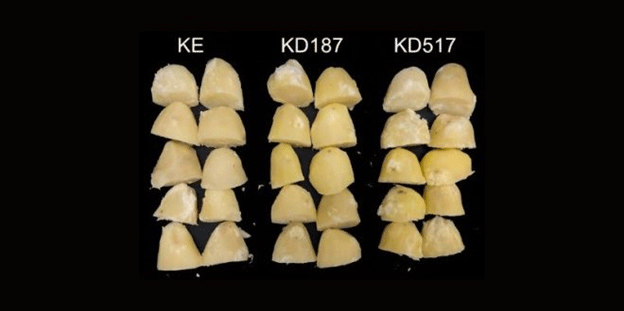In a significant leap forward for agricultural biotechnology, researchers from the Swedish University of Agricultural Sciences have utilized CRISPR/Cas9 technology to create a new generation of potatoes with enhanced resilience to both biotic and abiotic challenges. This advancement could potentially transform potato farming and address critical issues related to climate change and food security.
Breakthrough in Genetic Modification
The study, published in Horticulture Research, focuses on modifying the potato genome by targeting the StDMR6-1 gene. This gene alteration has resulted in potatoes that exhibit remarkable resistance to diseases such as late blight—a major threat to potato crops globally—as well as environmental stresses like salinity and drought. The CRISPR/Cas9 technology, known for its precision in genetic editing, has allowed scientists to improve the crop’s durability without compromising yield or tuber quality.
Addressing Climate Change and Crop Vulnerabilities
Potatoes, the world’s third-most important food crop, are particularly vulnerable to the effects of climate change, which exacerbates the prevalence of pests and diseases. The innovative approach of modifying the StDMR6-1 gene offers a robust defense mechanism against these challenges. By enhancing disease resistance and stress tolerance, these genetically modified potatoes can better withstand the harsh conditions brought about by climate fluctuations.
Implications for Sustainable Agriculture
This development has profound implications for sustainable farming. The ability to produce potatoes that are less reliant on chemical treatments—such as fungicides—could significantly reduce environmental impact and promote more sustainable agricultural practices. Additionally, the findings from this research extend beyond potatoes. The methodologies and insights gained could inform genetic improvements in other crops, contributing to a more resilient agricultural system overall.
Future Prospects
The work of Erik Andreasson and his team marks a promising step towards securing our food supply in the face of ongoing global challenges. As climate change continues to stress agricultural systems worldwide, such innovations are crucial for ensuring that we can maintain food production levels and quality. The potential to reduce reliance on chemical inputs while improving crop resilience underscores the importance of continued research and application of genetic technologies.
The application of CRISPR/Cas9 to enhance potato resilience represents a major advancement in agricultural biotechnology. By addressing both disease susceptibility and environmental stressors, this research not only promises to revolutionize potato farming but also paves the way for more sustainable agricultural practices. As we face increasing challenges from climate change, such innovations will be vital in securing a stable and resilient food supply for the future.







